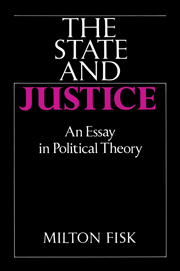Book contents
- Frontmatter
- Contents
- Preface
- Introduction: Can the state rule without justice?
- Part One An outline of a materialist political theory
- Part Two An assessment of the place of justice in the state
- Part Three A functional view of political institutions
- Part Four An account of the community of states
- Part Five A reflection on the transition to a new kind of state
- Conclusion: State, class, and democracy
- Notes
- Index
Part Three - A functional view of political institutions
Published online by Cambridge University Press: 06 July 2010
- Frontmatter
- Contents
- Preface
- Introduction: Can the state rule without justice?
- Part One An outline of a materialist political theory
- Part Two An assessment of the place of justice in the state
- Part Three A functional view of political institutions
- Part Four An account of the community of states
- Part Five A reflection on the transition to a new kind of state
- Conclusion: State, class, and democracy
- Notes
- Index
Summary
We often resort to exaggeration to get a neglected point across. Frequently, though, it leads to misunderstanding. I have been emphasizing the role of justice in state rule because it is often neglected in materialist political theory. Thus I have been at pains to call attention to the liberatory, unconditional, restraining, and noninstrumental side of the state. The king's peace is not only upheld by the the king's magistrate but is an embodiment of fairness not to be reduced to sectoral needs. Matters cannot be left there, since there is also an instrumental aspect to ruling. By appearing to give primacy of place to justice rather than to this instrumental aspect of ruling, my position is easily misunderstood as a version of the view that the state is a Rechtsstaat, that is, a legal association, an association for the protection of rights, an association in which no person or group is exempt from publicized limits of action. However, justice is not more important than the state's functioning to reproduce the economy.
I shall examine in this part a variety of state institutions that contribute to the reproduction of the economy. Some of them will be economic institutions, specifically those connected with welfare and subsidies. Others will be political institutions, specifically those connected with democracy and political parties. I shall raise the question whether these institutions can be accounted for by their functioning for the economy, once certain other requirements are satisfied.
- Type
- Chapter
- Information
- The State and JusticeAn Essay in Political Theory, pp. 139 - 140Publisher: Cambridge University PressPrint publication year: 1989



